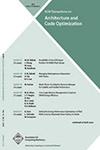Efficient Cross-platform Multiplexing of Hardware Performance Counters via Adaptive Grouping
IF 1.8
3区 计算机科学
Q4 COMPUTER SCIENCE, HARDWARE & ARCHITECTURE
引用次数: 0
Abstract
Collecting sufficient microarchitecture performance data is essential for performance evaluation and workload characterization. There are many events to be monitored in a modern processor while only a few hardware performance monitoring counters (PMCs) can be used, so multiplexing is commonly adopted. However, inefficiency commonly exists in state-of-the-art profiling tools when grouping events for multiplexing PMCs. It has the risk of inaccurate measurement and misleading analysis. Commercial tools can leverage PMCs but they are closed-source and only support their specified platforms. To this end, we propose an approach for efficient cross-platform microarchitecture performance measurement via adaptive grouping, aiming to improve the metrics’ sampling ratios. The approach generates event groups based on the number of available PMCs detected on arbitrary machines while avoiding the scheduling pitfall of Linux perf_event subsystem. We evaluate our approach with SPEC CPU 2017 on four mainstream x86-64 and AArch64 processors and conduct comparative analyses of efficiency with two other state-of-the-art tools, LIKWID and ARM Top-down Tool. The experimental results indicate that our approach gains around 50% improvement in the average sampling ratio of metrics without compromising the correctness and reliability.基于自适应分组的硬件性能计数器高效跨平台复用
收集足够的微架构性能数据对于性能评估和工作负载表征至关重要。在现代处理器中需要监视的事件很多,而只能使用几个硬件性能监视计数器(pmc),因此通常采用多路复用。然而,在为多路pmc分组事件时,最先进的分析工具通常存在效率低下的问题。它有测量不准确和误导性分析的风险。商业工具可以利用pmc,但它们是闭源的,只支持它们指定的平台。为此,我们提出了一种基于自适应分组的高效跨平台微架构性能测量方法,旨在提高指标的采样率。该方法根据在任意机器上检测到的可用pmc数量生成事件组,同时避免了Linux perf_event子系统的调度缺陷。我们在四种主流x86-64和AArch64处理器上使用SPEC CPU 2017评估了我们的方法,并与另外两种最先进的工具LIKWID和ARM自上而下工具进行了效率比较分析。实验结果表明,我们的方法在不影响正确性和可靠性的情况下,在指标的平均抽样比上提高了约50%。
本文章由计算机程序翻译,如有差异,请以英文原文为准。
求助全文
约1分钟内获得全文
求助全文
来源期刊

ACM Transactions on Architecture and Code Optimization
工程技术-计算机:理论方法
CiteScore
3.60
自引率
6.20%
发文量
78
审稿时长
6-12 weeks
期刊介绍:
ACM Transactions on Architecture and Code Optimization (TACO) focuses on hardware, software, and system research spanning the fields of computer architecture and code optimization. Articles that appear in TACO will either present new techniques and concepts or report on experiences and experiments with actual systems. Insights useful to architects, hardware or software developers, designers, builders, and users will be emphasized.
 求助内容:
求助内容: 应助结果提醒方式:
应助结果提醒方式:


